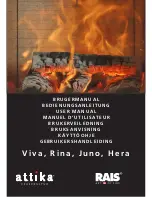
Safety Warnings & Recommendations
Please read this entire Owner’s Manual before installing or operating your Enviro Pellet Stove.
Failure to follow these instructions may result in property damage, bodily injury or even death.
Any unauthorized modification of the appliance or use of replacement parts not recommended
by the manufacturer is prohibited. All national and local regulations and shall be complied with
when operating this appliance.
Caution: Do not connect to any air distribution duct or system.
Warning: Never place wood, paper, furniture, drapes or other combustible materials within 48” (122cm)
of the front of the unit, 12” (30.5cm) from each side, and 4” (10cm) from the back of the unit. Do not let
children or pets touch it when it is hot.
To prevent the possibility of a fire, ensure that the appliance is properly installed by adhering to the
installation instructions. An Enviro dealer will be happy to assist you in obtaining information with regards
to your local building codes and installation restrictions.
FIRE EXTINGUISHER AND SMOKE DETECTION: All homes with a pellet burning stove should have at
least one fire extinguisher in a central location known to all in the household. Smoke detectors and carbon
monoxide detectors should be installed and maintained in the room containing the stove. If either sounds
the alarm, correct the cause but do not deactivate. You may choose to relocate the detection devises within
the room; DO NOT REMOVE THE SMOKE OR CARBON MONOXIDE DETECTORS FROM THE ROOM.
CHIMNEY OR RUN AWAY FIRE (SOOT/CREOSOTE): Call local fire department (or dial 911). Close
the draft fully. Extinguish the fire in the burn pot liner with a cup of water and close the door. Examine
the flue pipes, chimney, attic, and roof of the house, to see if any part has become hot enough to catch
fire. If necessary, spray with fire extinguisher or water from the garden hose. IMPORTANT: Do not operate
the stove again until you are certain the chimney and its lining have not been damaged. Check daily for
creosote build-up until experience shows how often you need to clean to be safe.
OPERATION: The door and ash drawer must be kept closed when the unit is in operation to prevent
fume spillage and for proper and safe operation of the pellet stove. Also ensure all gaskets on the door
are checked and replaced when necessary. Unit hot while in operation. Keep children, clothing and
furniture away. Contact may cause skin burns.
CAUTION: When operating during adverse weather, if the unit exhibits dramatic changes in combustion
stop using the unit immediately.
FUEL: This stove is designed and approved to only burn wood pellets of any quality
, corn, wheat, barley,
and grass. Dirty fuel will adversely affect the operation and performance of the unit and may void the
warranty. Check with your dealer for fuel recommendations. THE USE OF CORDWOOD IS PROHIBITED
BY LAW. Do not burn garbage or flammable fluids such as gasoline, naphtha or engine oil.
SOOT/CREOSOTE: Operation of the stove with insufficient combustion air will result in the formation
of soot/creosote which will collect on the glass, the heat exchanger, the exhaust vent system, and may
stain the outside of the house. Frequently check your stove and and adjust the combustion air trim and/
or if necessary adjust the slider/damper as needed to ensure proper combustion. See: “
s
LideR
/d
ampeR
s
etting
”.
CLEANING: There will be some build up of fly ash and small amounts of creosote in the exhaust. This will
vary due to the ash content of the fuel used and the operation of the stove. It is advisable to inspect and
clean the exhaust vent semi-annually or every two tons of pellets. The appliance, flue gas connector and
the chimney flue require regular cleaning. Check them for blockage prior to re-lighting after a prolonged
shut down period. If a significant layer of creosote has accumulated in the flue (3mm or more) it should be
removed to reduce the risk of a chimney fire.
ASHES: Disposed ashes should be placed in a metal container with a tight fitting lid. The closed container
of ashes should be on a non-combustible surface, well away from all combustible materials pending final
disposal. If the ashes are disposed of by burial in soil or otherwise locally dispensed, they should be retained
in the closed container until all cinders have thoroughly cooled.
5
4
Summary of Contents for M55C-FS-2
Page 33: ...33 Parts Diagram CAST 30 18 28 35 37 13 29 38 36 34...
Page 34: ...Notes 34...






































